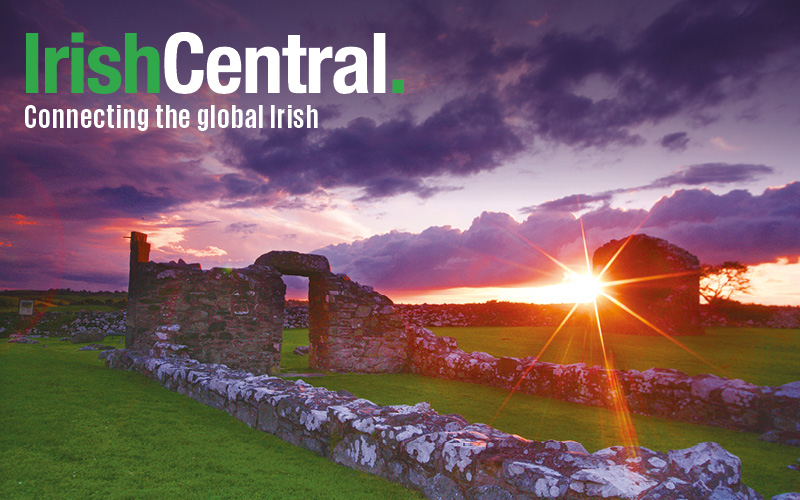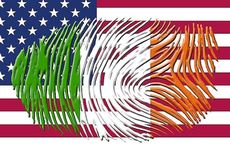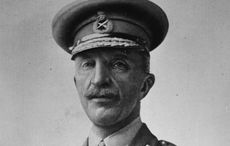| Hamza Yusuf Hanson |
Hanson should know. His great-great grandfather, Michael O’Hanson, left Ireland around the time of the Famine.
Along with his wife Bridget, O’Hanson settled in Philadelphia, where it wasn’t easy being Irish Catholic. Not for nothing did Hamza’s distant relative Anglicize his name by dropping the “O.”
These days, despite his Hibernian roots, Hamza Yusuf Hanson identifies himself as an “American Muslim” scholar who recently founded Zaytuna College in Berkley, California. That school is aiming to become the “first accredited Muslim college in the United States.”
As strange as that might sound, it’s probably no stranger than the notion of a “Catholic college” sounded some time ago.
So if we can have the Fighting Irish of Notre Dame, who’s to say deep into the 21st century, we won’t have the Fighting Arabs of Zaytuna, or elsewhere?
Michael and Bridget O’Hanson may or may not be rolling over in their Catholic graves, given the beliefs of their great, great grandson. But Hamza Yusuf Hanson is not the only American of Irish descent who has entered the world of Allah.
The rapper Everlast, formerly of the Irish American hip hop group House of Pain (remember the St. Patrick’s Day scenes in the ‘90s video “Jump Around”?) recently converted to Sunni Islam. Go to Facebook and you can find the aptly named group LIAM, which stands for the League of Irish American Muslims.
Most prominently, a few weeks back, an independent film called The Taqwacores was released.
Based on a book of the same name by Michael Muhammad Knight, the film is set in Buffalo and follows an average American white kid’s journey from angst to Islam. Along the way, he takes up what is probably his most passionate devotion -- punk rock.
By the way, the average punk kid in The Taqwacores was actually born and raised Irish Catholic.
The New York Times once dubbed Knight’s book a “Catcher in the Rye for young Muslims.”
The paper added, “Mr. Muhammad Knight was born an Irish Catholic in upstate New York and converted to Islam as a teenager. He studied at a mosque in Pakistan but became disillusioned with Islam after learning about the sectarian battles after the death of Muhammad.”
In a more recent book, Blue-Eyed Devil: A Road Odyssey Through Islamic America, Knight writes a length about the conflicts of being raised Irish Catholic and converting to Islam.
There’s a scene with his old Irish grandfather, who used to walk young Michael to church “on weekday mornings to sit down and stand up and sit down again and stand up again and kneel on the padded kneeler before a tall bloody Christ.”
There also a tense scene with “an archetypical old Irish fireman,” and reflections on another Irish American who made his own journey to Islam, John Walker Lindh, the so-called “American Taliban” who vowed to kill Americans in the name of Islam.
To some, these fine Irish Catholics converting to Islam are surely proof that we are too lenient or too secular or not nearly rigid enough in our Catholicism.
I would suggest that it’s mainly a product of living in America, where cultural collisions are at least as much of a rule as they are an exception.
Now, that does not mean this will be easy. Hamza Yusuf Hanson wrote in a recent Christian Science Monitor article, “The mid-19th century struggle of Irish-Catholics to be fully accepted as Americans should give today’s Muslims hope that their efforts to weather the storms of controversy and mistrust will bear fruit.”
Maybe. On the other hand, though it was not hard to find 19th century Protestants and Catholics literally clubbing each other in the name of religion, things are different today.
Elements of Islam have declared war on America, while that was not the case with Catholics back in the 1800s.
In the end, however, terrorism is not how most Americans -- Catholic or Muslim or whatever -- are going to experience good old-fashioned American culture clash.
Mostly, there will be intermarriage and earnest conversions, and some of those marriages will be successful and some won’t. Some of those conversions will be permanent and some will not.
One thing we can be sure of is that they will continue to happen.
(Contact Sidewalks at tomdeignan@earthlink.net or facebook.com/tomdeignan)




Comments